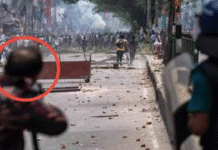Culture of impunity, lengthy justice process behind such heinous incidents, says NHRC chief

Referring to the brutal murder of Rifat Sharif, National Human Rights Commission Chairman Kazi Reazul Hoque said the ongoing “culture of impunity” and “lengthy legal process” are the reasons behind the rise in such crimes in the country.
“The rule of law has not yet been established in the country. And that is why Rifat was murdered in the broad daylight and Nusrat was burnt to death,” the NHRC chief told journalists after attending the 5th National Conference of Sector Commander’s at the city’s Officer’s club.
Police can complete investigations and submit charge sheets in one month if they want, the NHRC chief said adding that only then the justice process can be quickened.
“Owing to the delay in legal process, criminals believe they can get away with any crime very easily,” Kazi Reazul Hoque said.
In reply to a query on the delay in the arrest of Sabbir Hossain Nayan, the prime accused in the case, the NHRC chief said, “It is very easy to arrest Nayan. It is nothing tough, especially since Barguna is a very small town and he is a known face.”
Twenty-five-year-old Rifat, who used to provide internet service in Barguna, was attacked with sharp weapons in front of his wife in broad daylight on June 26. He was pronounced dead at Barishal Sher-E-Bangla Medical College Hospital (BSMCH) later.
The entire incident, which was captured possibly on a mobile phone, shows the attack on the youth in Barguna town in front of Barguna Government College around 10:30am yesterday, where Rifat went to drop-off his wife.
Footage of the incident went viral on social media yesterday.
Madrasa student and Alim examinee Nusrat Jahan lost her battle for life, five days after she was set afire at a madrasa in Feni on April 6. A group of five people poured kerosene on the 18-year-old girl and set her on fire allegedly for refusing to withdraw a case against the principal of the madrasa over sexual assault on her late last month.











